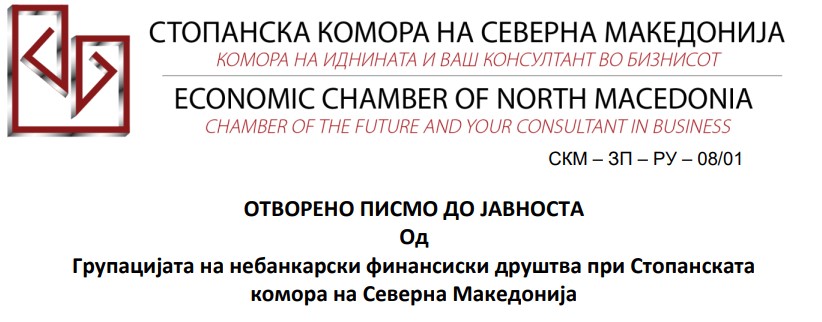„Dimitrie Cupovski“ 13, 1000 Skopje +38923244000 ic@mchamber.mk
„Dimitrie Cupovski“ 13, 1000 Skopje +38923244000 ic@mchamber.mk

We are closely following the public discussion initiated by the investigative story and documentary Stolen Lives (Украдени животи) by the Investigative Reporting Lab (IRL). The Group of Non-Banking Financial Companies, as always, approaches all journalistic reports with due respect and honors the professionalism and independence of journalists in the country. Supporting investigations, including IRL's latest, financial companies stand in alignment with the media to increase transparency in the financial system and raise public awareness about responsible lending.
On the other hand, the Group has also been in close cooperation with the Ministry of Finance. Over the past two years, key legal amendments and rulebooks have been introduced, significantly improving the sector’s regulation, reducing the risk of over-indebtedness among citizens, raising the threshold for establishing financial companies, and strengthening credit applicant verification processes to minimize fraud. Additionally, with investments in new technologies, the sector has evolved into a modern, highly digitalized segment of the country's financial system.
With the adoption of amendments to the Law on Financial Companies in July 2023, the minimum capital for establishing a financial company increased from €100,000 to €500,000, ensuring greater stability. The new regulations capped credit costs to protect consumers and introduced a ban on refinancing overdue loans within the same financial company.
Furthermore, with the introduction of the Rulebook on Credit Risk in April this year, monthly credit liabilities were limited to 70% of income to prevent potential over-indebtedness of individuals and families. After the law and rulebook came into force, the number of financial companies operating in the market decreased from 36 to 27.
In the meantime, technological investments have enabled enhanced client verification and automated document validation to prevent fraud through registered electronic identification schemes.
Statistics reveal that out of over 220,000 approved loans annually, only 0.045% involve suspected fraud. Since implementing the new legal regulations requiring either physical presence or a registered security scheme for identification, fraud cases have almost disappeared.
Credit growth in non-banking financial companies for the first half of this year was 4%, aligning with the banking sector’s growth. However, financial companies contribute just 2% to the total assets of the country’s financial system.
Additionally, nearly 40% of users of financial companies' services have at least a higher level of education, according to an independent 2021 study.
Today, our country has one of the strictest regulations in Europe, successfully combining technological innovation with consumer protection.
Owing to these best practices, the case analyzed in IRL's report was resolved as early as 2023. The companies, on their initiative, halted the collection process for credit claims flagged by institutions as potentially fraudulent. In the presented case involving the affected individual, all financial companies where she held loans accommodated her, either fully writing off the debts or halting collection processes. This demonstrates that financial companies may be among the few entities that immediately act at their own material expense to assist individuals reporting stolen identities.
Non-banking financial companies remain committed to continuously improving their services and protecting users. Our goal is to contribute to developing a modern, secure, and fair financial system in the country, based on trust and transparency. The Group remains open to constructive dialogue with institutions and media to build trust in the sector.
Respectfully,
President
Group of Non-Banking Financial Companies